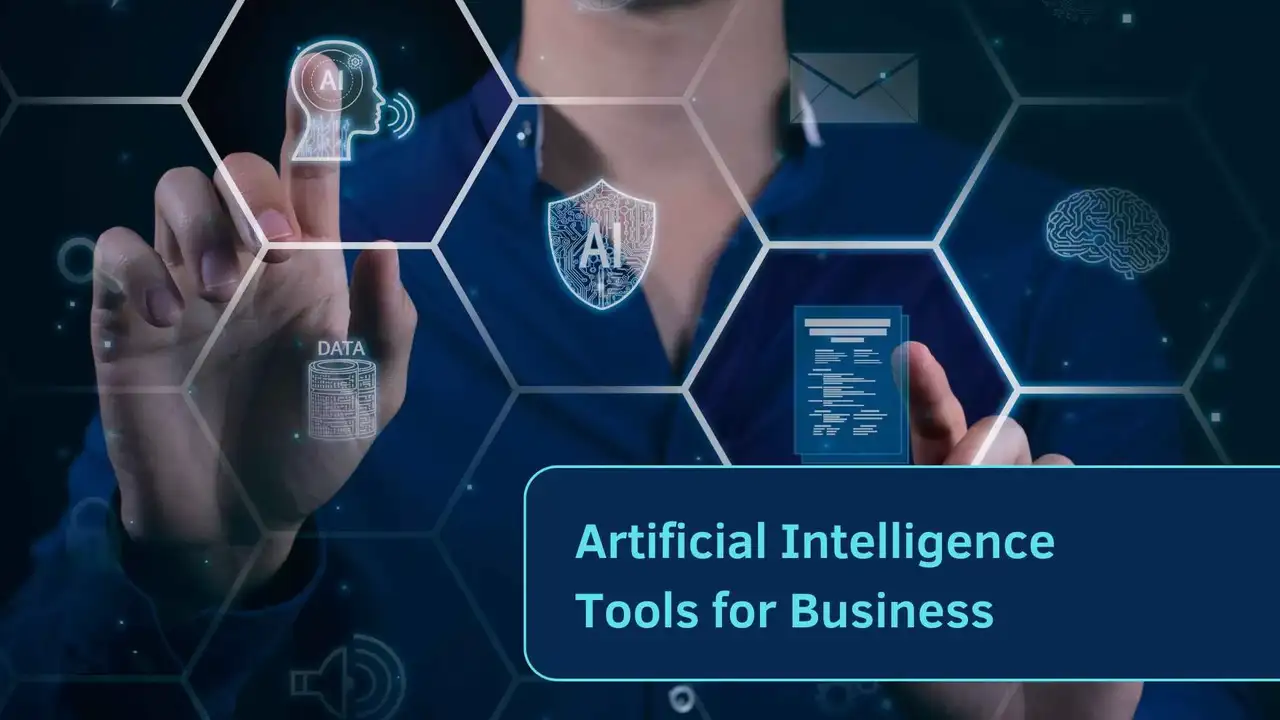Artificial Intelligence Tools for Business: Revolutionizing the Corporate World
Introduction to AI in Business
The business landscape is undergoing a seismic shift, thanks to the advent of artificial intelligence tools for business. From the early days of simple automation to today’s sophisticated AI systems, businesses are leveraging these tools for unparalleled growth. AI’s impact on modern business spans various sectors, offering smarter, faster, and more efficient processes.
The Evolution of AI traces back to the mid-20th century, but it’s the recent advancements that have catapulted AI to the forefront of business innovation. AI’s Impact on Modern Business is undeniable, transforming everything from customer service to strategic decision-making.
Understanding AI Tools
Artificial intelligence tools for business are not a monolith; they vary greatly in functionality and application. Types of AI Tools range from machine learning algorithms to natural language processing software. How AI Tools Function involves complex computations and data analysis, enabling them to learn and improve over time.
AI in Business Analytics
AI for Data Analysis is revolutionizing how companies handle vast amounts of data, turning it into actionable insights. Predictive Analytics with AI goes a step further, forecasting future trends and behaviors, thus allowing businesses to make proactive decisions.
AI for Enhanced Customer Experience
The customer experience is paramount, and AI is elevating it to new heights. Chatbots and Virtual Assistants provide 24/7 customer service, while Personalization with AI ensures a tailored experience for each customer, enhancing satisfaction and loyalty.

AI in Marketing and Sales
AI’s influence in Marketing and Sales is profound. AI-driven Marketing Strategies enable precise targeting and personalization, while Sales Optimization with AI helps in identifying potential leads, thus boosting sales efficiency.
AI in Human Resource Management
AI streamlines Human Resource Management by automating repetitive tasks. Automated Recruitment Processes make hiring more efficient, and Employee Engagement with AI tools helps in better managing workforce dynamics.
AI for Financial Management
Financial management is critical, and AI is proving to be a game-changer. AI in Accounting automates and improves accuracy in financial operations, while Risk Management and AI helps in identifying and mitigating financial risks effectively.
AI in Supply Chain and Logistics
In Supply Chain and Logistics, AI enhances efficiency and accuracy. AI for Inventory Management optimizes stock levels, and Optimizing Logistics with AI ensures smoother, cost-effective operations.
AI Tools for Security and Compliance
Security is paramount, and Cybersecurity with AI offers advanced protection against threats. Compliance Monitoring through AI ensures adherence to regulations, safeguarding against legal and financial repercussions.
Training and Implementation
Implementing AI requires preparedness. Preparing Employees for AI involves training and orientation, while Integrating AI into Business Processes ensures a smooth transition and maximizes benefits.
AI in Decision Making
AI significantly aids in Decision Making. AI for Strategic Planning provides deep insights for long-term strategies, and Data-driven Decisions with AI ensures choices are based on solid, analytical grounds.

AI and the Future of Work
AI is shaping the Future of Work. AI’s Role in Shaping Future Jobs is significant, necessitating new skills and roles. Preparing for an AI-Driven Future is crucial for businesses to stay competitive.
Challenges and Limitations of AI
Despite its benefits, AI has its Challenges and Limitations. Ethical Considerations like privacy and bias, and Technical Limitations like data quality and dependency, need addressing.
Success Stories of AI in Business
Learning from Success Stories is vital. Case Studies demonstrate AI’s transformative power, and Lessons Learned provide valuable insights for future implementations.
Choosing the Right AI Tools
Selecting the right AI tools is crucial. Assessing Business Needs helps in identifying the appropriate tools, and Evaluating AI Tool Providers ensures the right partnership for successful implementation.
The Cost of AI Integration
Understanding the Cost of AI Integration is essential. Investment and ROI analysis helps in financial planning, while considering Long-term Financial Implications ensures sustainable integration.
Artificial Intelligence Tools for Business
In this section, we delve into an Overview of Popular Tools used in various business sectors and how to Select Tools Aligned with Business Goals for optimal performance and results.
Conclusion and Future Outlook
In conclusion, AI tools are not just a technological advancement; they are a cornerstone of modern business strategy. The Road Ahead for AI in Business looks promising, with continuous innovations and applications emerging.
Artificial Intelligence Animation Generator: Unleashing Creativity Through Technology
Frequently Asked Questions
How do artificial intelligence tools for business enhance customer experience in business?
Artificial intelligence tools for business have revolutionized customer experience by providing personalized interactions and support. With technologies like chatbots and AI-driven recommendation systems, businesses can offer round-the-clock customer service and tailored product suggestions, greatly enhancing the overall customer experience. These tools analyze customer data to understand preferences, anticipate needs, and offer solutions promptly, leading to higher satisfaction and loyalty.
What are the primary challenges businesses face when implementing AI?
The major challenges include the complexity of integrating AI with existing systems, the need for significant investment in technology and training, and concerns about data privacy and security. Additionally, businesses often face difficulties in finding the right talent to manage and maintain AI systems. Overcoming these challenges requires careful planning, skilled human resources, and a focus on ethical AI use.
Can small businesses benefit from AI tools, and if so, how?
Absolutely, small businesses can leverage AI tools to gain a competitive edge. AI can automate routine tasks, provide insights into customer behavior, and optimize marketing efforts, even with limited resources. Tools like AI-driven analytics platforms, chatbots, and CRM systems are now more accessible and affordable, enabling small businesses to streamline operations, enhance customer service, and make data-driven decisions.
How does AI contribute to data-driven decision-making?
AI contributes to data-driven decision-making by processing and analyzing vast amounts of data more efficiently than humanly possible. It identifies patterns, trends, and insights that can inform business strategies. AI algorithms can predict future market trends, customer behaviors, and business outcomes, enabling companies to make proactive, informed decisions.
Conclusion
AI tools are revolutionizing the business world, offering unprecedented opportunities for growth, efficiency, and innovation. As we embrace this AI-driven era, businesses must adapt and evolve to leverage the full potential of these powerful tools.








